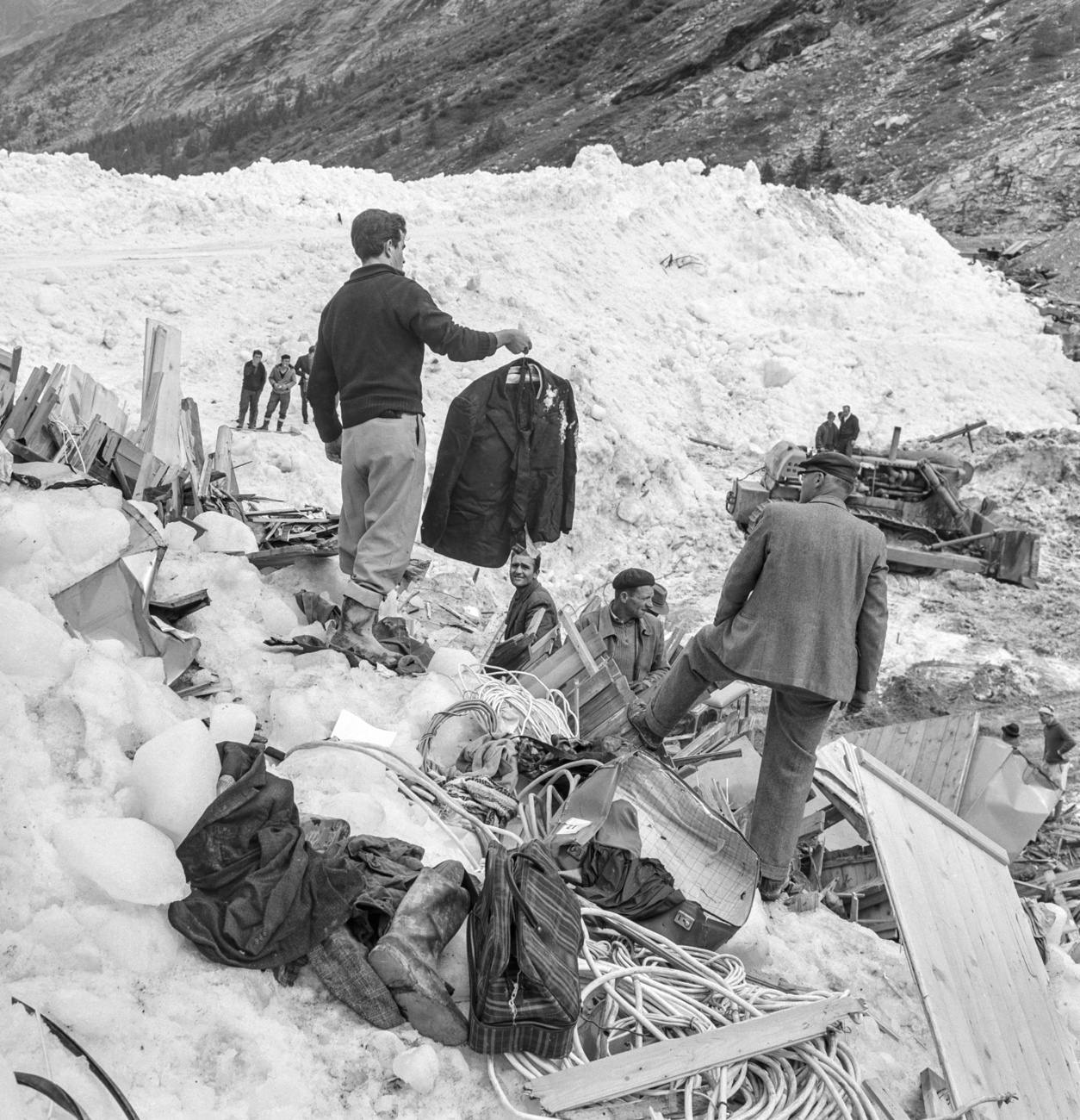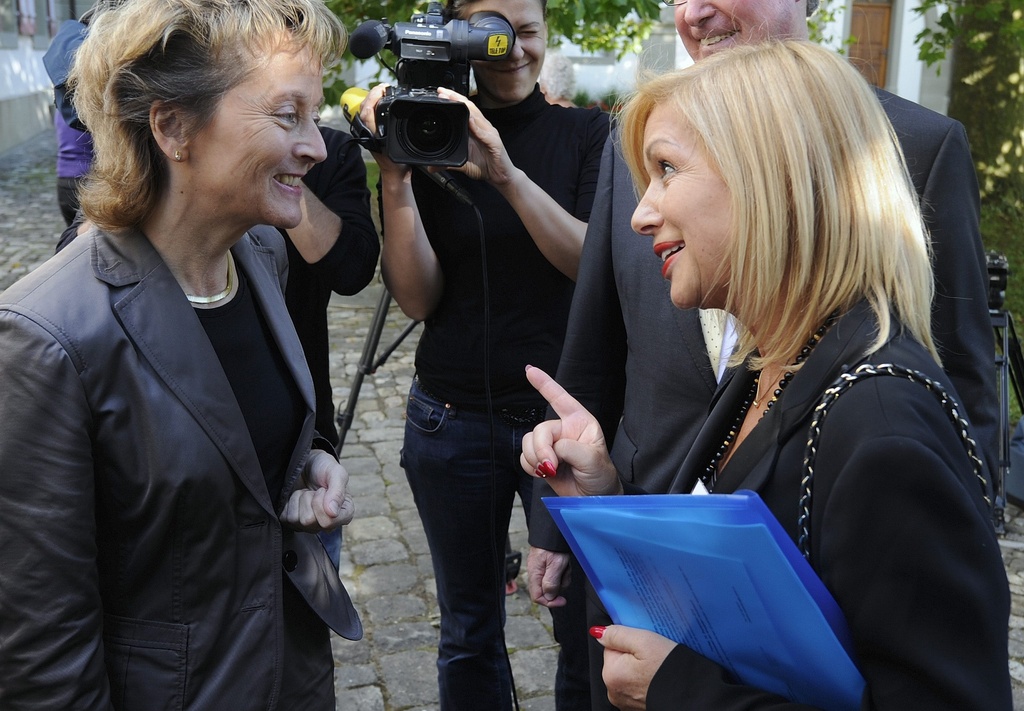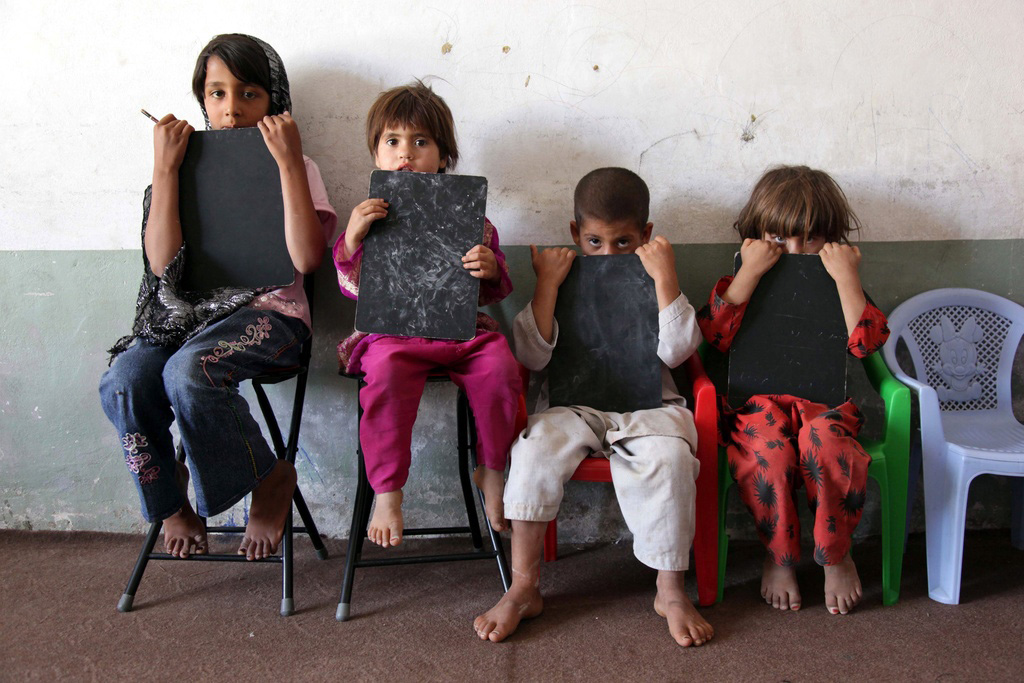
Recalling the pain of forced adoption

They came for her one day in the café where she worked – two policemen and a woman from the authorities. “It’s a nice day,” they said, “we’re going for a drive”.
For the next 16 months Michèle Gillard would be in “administrative care”, her rights as a free citizen temporarily suspended.
Until 1981, young people who stepped out of line could be deprived of their freedom without trial or any means of appeal. A recommendation from the guardianship authorities was often enough to seal their fate.
On the grounds of “depraved lifestyle”, “licentiousness” or “alcoholism”, victims were often placed in prisons alongside genuine criminal offenders. Others ended up in residential institutions. The Swiss justice minister apologised last year to all those imprisoned under this legal provision.
National figures have not yet been compiled as the legal procedure was implemented independently by each canton but Bern, for example, recorded 2,700 cases in the four decades the law was in place.
Many cases involved young girls who got pregnant, were then shunned by their families and ended up being forced to give up their babies for adoption.
Confinement
So it was in the winter of 1970 for 21-year-old Gillard. She cried all the way on the drive from Delémont in French-speaking western Switzerland to the “social home” in Walzenhausen in the German-speaking east.
“It was terrifying, arriving in this building in a forest and seeing the girls’ faces, like a horror film. ‘How long are you in for?’, they asked me but I had no idea, all I could do was cry.”
The home in canton St Gallen was notorious among interned girls as a stepping stone to the country’s main women’s prison, Hindelbank in Bern, according to Gina Rubeli-Eigenmann of the victims support group Administrativ Versorgte 1942-1981.
“For the slightest thing that happened in Walzenhausen, you would end up in Hindelbank and many mothers signed adoption papers under fear of being transferred there,” explained Rubeli-Eigenmann, who herself spent time at Hindelbank under the same “administrative care” legal provision.
For the remaining months of her pregnancy Gillard walked to work every day at a nearby factory in Wolfhalden where she embroidered handkerchiefs. She was not entitled to keep her earnings. In the evenings the girls watched correctional films or knitted.
Unhappy memories
It was not the first time that Gillard had lived in an institution. After her parents’ marriage broke up, she was sent to an orphanage in Epagny, Fribourg run by the Roman Catholic Sisters of Ingenbohl.
In December 2010, the Sisters appointed a committee of outside experts to investigate allegations of abuse and cruelty in the past in the homes and schools run by the order.
Gillard lived in the orphanage in Epagny from the age of six to 13, a time of brutality, hunger and terror, as she remembers it.
There followed an unhappy period when Gillard and her younger sister tried to live with their father and his new wife. Her sister managed to challenge her father’s status as guardian in court and went to live with another family.
At 19, Gillard found lodgings with an old woman in Delémont and started work in a café. She began to enjoy a life of relative freedom after the restrictions and privations of her childhood. It wasn’t to last.
“Naive”
“I was having a good time, going out and meeting boyfriends. But I was ignorant, I was naive, I think I was stupid really. We had been told nothing. The only education I received was the ABC.”
On a night out with her brother, with whom she had been temporarily reunited, Gillard was not able to gain access to the house where she was staying, because she says, she had forgotten her key and the landlady was deaf.
So she and her brother decided to sleep outside nearby, only to be picked up by the police. In the conservative society of the time, far from being dismissed as a harmless teenage prank, this incident earned Gillard a charge of vagrancy and put her on the radar of the local authorities.
By the time she fell pregnant, wheels were already in motion to have her sent away to an institution.
Her family, such as it was, was not prepared or able to help. The father of the child, although he said he wanted to support her, was threatened with being cut off by his family and kept his distance.
And so it was that Gillard found herself in the summer of 1971 on the other side of the country in a maternity clinic cut off from anyone she knew.
“Phone calls forbidden, visits forbidden, I had no-one.”
Kindness of strangers
Gillard breaks down as she remembers the kindness of one midwife who asked other nurses to sit with her during visiting hours and brought presents.
“I stayed a few days there and then they came to collect me. I thought everything was fine but afterwards they put my daughter in a different section, I was sent back to work and I only saw her for a half an hour per day.”
Five months later Gillard’s father and step-mother, with the full support of the authorities, wanted to take custody of the baby girl and Gillard was unable to stop them.
After being released from Walzenhausen, she was barred from their home but refused to sign the adoption papers for years until she eventually gave in when the child was aged seven.
Shame
Deprived of her first child, Gillard felt great shame and unhappiness in the years that followed.
She had another child several years later while living independently who was also taken for adoption, after the authorities threatened to withdraw her social security payments. Taken, not given, she says.
Gillard did manage to meet with her two biological daughters when they reached adulthood but she said the gulf was too great to build proper relationships with them.
Now aged 62, Gillard lives with her husband in modest circumstances and does not talk about her past with friends and acquaintances. Out of shame and fear, she explains. Shame for herself after a lifetime of being judged and mistreated, fear of not being believed; of being thought a liar.
Society was largely unaware of how frequently and arbitrarily this legal provision was being applied, according to Gina Rubeli-Eigenmann of the victims support group Administrativ Versorgte 1942 – 1981.
“Switzerland needs to look again more closely at its recent social history, especially as so many victims are still living who suffered this ill-treatment,” she told swissinfo.ch.
In September 2010, at a commemorative event in Hindelbank, then Justice Minister Eveline Widmer-Schlumpf apologised to the young people sent to prison between 1942 and 1981 without a trial and despite having committed no crime.
Former victims say their ordeal was made worse by having to live with the stigma of being an ex-con and claim they often faced discrimination in later life.
Parliament is due to vote later this month on a motion submitted by Social Democrat Jacqueline Fehr which is linked to the issue of administrative care and forced adoptions.
Fehr’s motion seeks to make it easier for biological parents whose children were adopted to make contact with their adult children.
Currently the adult child is not informed when a parent makes a request to contact them and both parties have to wait until the child takes the initiative.
In her submission to parliament Fehr wrote: “Pregnancy outside marriage was a common ground for administrative care and so there were numerous young mothers among the interned women. Many of these young women gave up their newborns for adoption under great pressure from the institutions’ management.
“Most of them have not seen their children since then and know nothing about their identity and circumstances. This situation is an additional heavy burden for the affected women.”

In compliance with the JTI standards
More: SWI swissinfo.ch certified by the Journalism Trust Initiative








































You can find an overview of ongoing debates with our journalists here . Please join us!
If you want to start a conversation about a topic raised in this article or want to report factual errors, email us at english@swissinfo.ch.